A website now offers a Netflix-type subscription to recorded plays. But, is Mumbai theatre ready to upload its works?
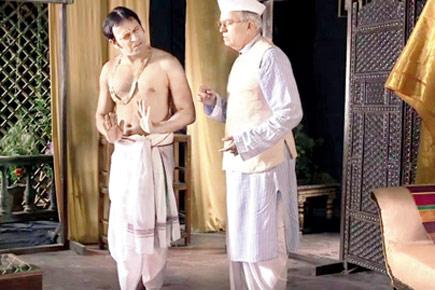
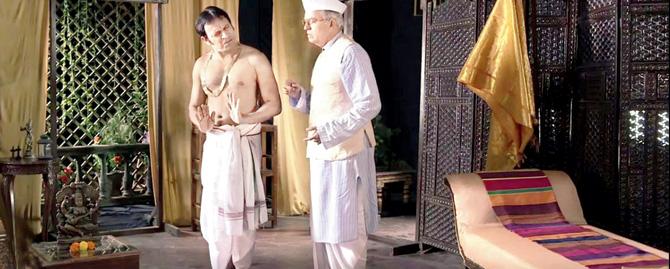
The CinePlay experience is now also available on Hotstar, where a subscription allows you to access 11 plays currently. The plan is to add 20 more titles by June. In this still, Joy Sengupta and Vijay Crishna enact a scene from Dance Like A Man
ADVERTISEMENT
Having watched Tom Alter play the last Mughal emperor, Bahadur Shah Zafar, at Nariman Point's YB Chavan auditorium in 2012, we have wanted once more to catch the veteran actor play, as few can, with Urdu. So, although his other acclaimed play by Sayeed Alam led Pierrot's Troupe has come to Mumbai from Delhi, it hasn't been possible. Theatre and its enthusiasts often end up star-crossed lovers in the feud between time and location.
The digital age, however, does have both the ability and promise to bridge this gap.
A Delhi-based start-up with a to-the-point name, playmyplay.com, has brought theatre from the capital to your smartphone/tablet for a subscription fee of Rs 399 per year, allowing you to view productions from a bouquet of over 150 plays, by 50 groups that have been recorded live across venues in Delhi.
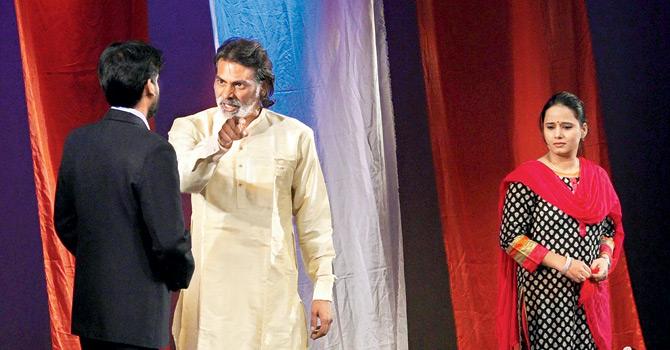
A scene from Hamlet by Delhi's Prism Theatre Society, directed by Jatin Sarna
Don't miss my show
Harkirat Sandhu, 39, a digital media professional who has been a Dilliwala for 15 years, says that the firm started recording plays in August 2016, by which time the website was ready. Once, while hanging out with friends from theatre community, he was asked to attend a play. "I told them that I couldn't attend it that weekend. We'd do it perhaps the next. That's when a friend said, 'Babu, it's not a picture that you can catch it when you want. Is week hai to hai, otherwise, you watch it when we stage it next'," he says over a telephonic interview.
It struck Sandhu that theatre groups practise for weeks together to stage one show in a month. He thought, it might be time to change the way theatre, essentially a perishable commodity, is consumed. Sandhu, whose office was near Mandi House, allowing him the luxury of catching a play twice a month, says the recording of any play begins with convincing the group's director that the enterprise will let them showcase their work to a larger audience. In the last five months, they have got 500 subscribers - 20 per cent of this is from NRIs from New Zealand and Canada. As far as economics go, the idea, says Sandhu, remains to share the spoils with the theatre group. While earlier, the model was simple - on a pay per view basis 50 per cent would go to the site, and 50 to the theatre group - the Netflix-like subscription model throws up a challenge. After all, dividing the spoils according to each play that a viewer may have watched might be a hair-splitting task.
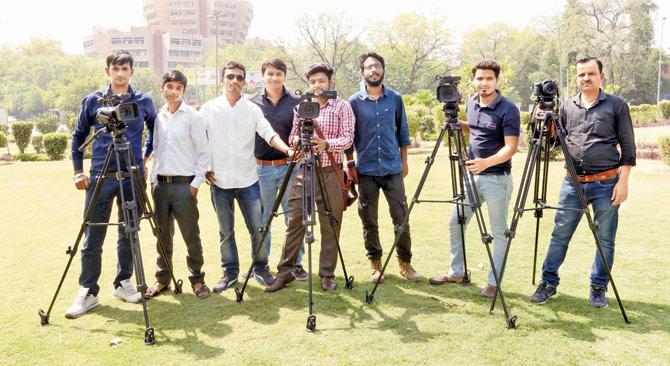
Playmyplay, founded by Harkirat Sandhu & Padam Sandhu, uses the three-camera set- up, where a camera is placed in the seating area on the right, left and centre of the stage. Pic/Ajay Gautum
A one-person audience
Sandhu says he was prodded to watch plays by friends who urged him to catch the raw energy of an actor on stage. "There's a human element in theatre that can't be replaced. It's perhaps why, though it's the oldest story telling medium, it survives," he adds.
Yet, ventures such as his, argues Quasar Thakore Padamsee, mumbai-based actor turned theatre director, and son of Alyque Padamsee and Dolly Thakore, take away the humanness from theatre. Padamsee, 39, points out to the seating of an auditorium, with its chair backs not completely letting you sink in unlike what's offered at a cinema. "The human eye has an in-built zoom lens and we can focus on the actor or area we want to while watching a play. Here [in recorded theatre] you have the camera doing that work for me, limiting my experience," he adds. Then, there could be other experiences lost. He recalls the staging of So Many Socks, written by Annie Zaidi which he directed, in Ahmedabad. Inspired by Tibetan activist Tenzin Tsundue's collection of poems, Kora, Padamsee says the play was half-way at an outdoor venue when it started pouring. The play, on the Tibetan freedom movement, had to be moved inside in this case, but with the audience too engrossed to move, the actors continued to stage it, drenched.
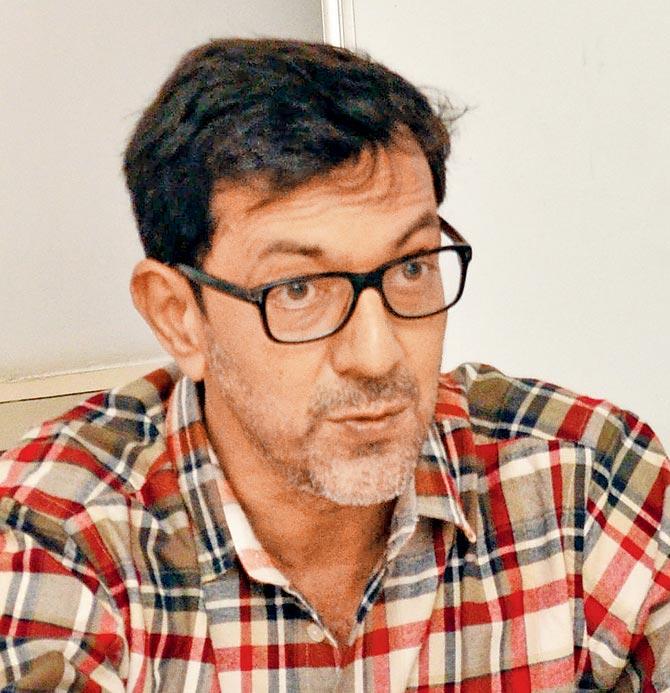
Rajat Kapoor, Actor-Director
But, one musn't confuse the two experiences, says Mumbai-based entrepreneur Subodh Maskara. "It's the difference between watching a cricket match live in a stadium, where you can't even see the ball, and watching the match at home where every move is in close-up," says Maskara.
In 2015, Maskara launched CinePlay, meant to offer a cinematic version of theatre. Unlike playmyplay, which records the play while it is staged on screen, CinePlay takes the play and shoots it over days in a studio but with the sets as they are meant to remain and the same script. For instance, Mahesh Dattani's Dance Like a Man, directed by Lillete Dubey's Primetime Theatre Co. for stage, and directed by Ritesh Menon and Lillete Dubey for CinePlay, has a scene involving actor Vijay Crishna playing the role of his own father. As the lighting dims, Crishna, the son, slips on a topi and Nehru jacket. The scene is retained in the CinePlay version. Dubey says, while shooting, which took about seven days, there was an effort to ensure that the camera did zoom out to allow the viewer to not forget that what they were watching, after all, was a play. Yet, because the medium has changed, a dialogue may not be needed where camerawork would suffice. The CinePlay version is then, shot like cinema. Would it not work then to just record the play? Maskara says matter-of-factly, "I don't think the audience is ready for an inferior experience."
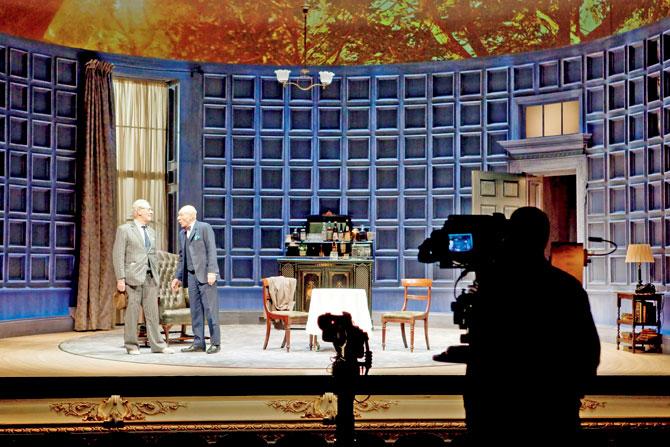
Two full-camera rehearsals take place before each National Theatre Live recording, with time in-between for the stage director and camera director to work together to discuss how best to capture the production
Keep the theatre on screen
Playwright and theatre director Rahul da Cunha, who runs Rage Productions along with actors Rajit Kapur and Shernaz Patel, says taking the stage out of the theatrical experience misses the point.
While CinePlay, which he feels is more of a documentary version of what happens on stage, falls short, he says the National Theatre Live version - in which London's Royal National Theatre records its plays and screens them across the world with institutions it has tied-up with, for instance the National Centre of Performing Arts in Mumbai - offers the experience of watching a play, albeit on a screen, with an audience.
Explaining the process of how a play is recorded, Emma Keith, Head of NT Live and Broadcast, says over an email interview: "Two full camera rehearsals take place before each broadcast, with time in-between for the stage director and camera director to work together to discuss how best to capture the production. Adjustments are made for lighting, sound and make-up; however this is all with the aim of preserving the integrity of the original design."
She adds, "The approach to filming National Theatre Live broadcasts is to prioritise the audience in cinemas for that night. The camera director is given flexibility in choosing camera positions, so that the performance can be captured from the best seats in the house and with a sophisticated setup. The audience in the
National Theatre are aware that cameras will be present, so the theatre is transformed into something of a live studio."
Asked about the concerns that they keep in mind while editing the footage, she says, "National Theatre Live is not about turning a stage play into a film. Rather, the intent is to faithfully capture the live performance. The use of high definition cameras and the scale of the big screen allow the aesthetic to remain theatrical and offer audiences a dynamic full stage picture. This is matched with the intimacy the camera can offer, taking the audience to the heart of the emotion and the nuances of the actors' performances. The broadcasts also feature live interviews (usually with members of the creative team) and, sometimes, a pre-show film which offers a look behind the scenes or greater insight into the production."
Yet, recording theatre performances is not very new at all, says Deepa Gahlot, Head, Theatre and Films, NCPA. Marathi and Gujarati theatre groups have been doing it for ages, she says. "Once a play's shows neared the end, they would record it, make DVDs and circulate them." While NCPA does record its own productions, these are not monetised and are available only as archival footage.
Kunal Kapoor, Trustee of Juhu's Prithvi Theatre says, "NT Live is very different from what playmyplay or Cineplay is offering - both in quality and availability. The worry is that recorded plays should not become cheap TV series/films which will damage the impression of what live performances are all about."
The last act
No one - not Sandhu, not Maskara - suggest you stream your play where you could watch a live one. The former, they want to make available for when you cannot watch a play (say it's being staged in another city), or want to experience the same differently (perhaps see an actor's expression from a performance you watched on the last row).
Padamsee, and many within the community agree, that the only time a play should be recorded is when it's meant to be archived - on the last show, before the production ends. It might be, as Dubey says, an important way of leaving behind the legacy of Indian plays. "To document what we did for posterity."
 Subscribe today by clicking the link and stay updated with the latest news!" Click here!
Subscribe today by clicking the link and stay updated with the latest news!" Click here!






